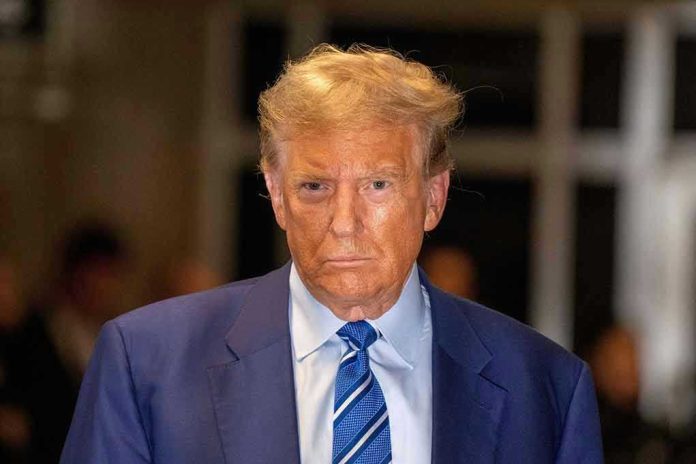
A federal appeals court has upheld an $83.3 million defamation verdict against President Trump, sustaining a legal blow that his supporters view as a direct attack on personal accountability and the rights of conservative leaders.
Story Snapshot
- A federal appeals court affirmed Donald Trump’s personal liability in the E. Jean Carroll defamation case, leaving him responsible for $83.3 million in damages.
- The court rejected efforts to substitute the U.S. government as defendant, clarifying the limits of presidential immunity in civil cases.
- This landmark decision sets a precedent for holding public officials personally accountable for private statements and actions.
- Many conservatives view the case as politically motivated, raising concerns about judicial overreach and the erosion of constitutional protections for leaders who challenge leftist narratives.
Appeals Court Upholds $83.3 Million Defamation Award Against Trump
The U.S. Court of Appeals for the Second Circuit ruled that President Trump remains personally liable for $83.3 million in damages to E. Jean Carroll, upholding a federal jury’s finding that his public denials and statements about Carroll’s sexual assault allegations constituted defamation. Trump, who was accused by Carroll of assault dating back to the mid-1990s, faced two separate lawsuits resulting in jury verdicts that together total over $88 million. The appellate court’s decision, issued in June 2025, marks a critical moment in the ongoing legal saga surrounding Trump’s personal conduct and public speech.
The heart of the legal battle revolved around whether Trump’s statements denying Carroll’s allegations were made within the scope of his official duties as president or as a private citizen. Trump’s legal team, backed by the Department of Justice, argued for the substitution of the United States as the defendant under the Westfall Act, which shields federal employees from personal liability for actions taken within their job responsibilities. The appellate court firmly rejected this move, stating that Trump’s comments were personal in nature and not part of his official presidential duties. This clarification sets a significant legal precedent, shaping the boundaries of presidential immunity in future civil litigation.
Background: Carroll’s Lawsuit and the Legal Context
E. Jean Carroll, a journalist and author, filed her first defamation lawsuit against Trump in 2019 after he publicly denied her claims, calling her a liar and asserting he never met her. A second lawsuit followed in 2022 under New York’s Adult Survivors Act, which temporarily revived expired claims of sexual misconduct. Both cases proceeded through federal court, with juries in each finding Trump liable for defamation and, in one instance, sexual abuse. The litigation unfolded amid the heightened climate of the #MeToo movement, intensifying debate over the accountability of powerful men and the use of civil courts to address reputational harm stemming from public statements.
Legal experts and commentators note that the case is exceptional, not only for its high-profile defendant—a sitting and now returning president—but also for its use of state legislation to revisit decades-old claims. The Westfall Act argument, tested in this case, has rarely been deployed in such a politically charged context. The court’s decision that Trump acted outside the scope of federal employment when addressing personal allegations signals a narrowing of immunity for public officials, potentially exposing current and former leaders to similar lawsuits when their remarks are deemed private or personal.
Ramifications for Presidential Immunity and Conservative Concerns
The appellate court’s ruling delivers a significant financial and reputational blow to President Trump and, by extension, raises alarms among conservatives about the broader implications for executive power and constitutional protections. The decision reinforces the idea that even the nation’s highest officeholder can be held personally responsible for statements made outside official duties. For many on the right, this case is emblematic of a legal system increasingly weaponized against conservative figures, with judicial decisions that threaten to chill free speech and undermine traditional values of due process and limited government.
Supporters of Carroll and progressive activists hail the verdict as a victory for survivors of sexual assault and for the principle that no public official is above the law. Conversely, Trump’s base views the ongoing litigation as politically motivated, warning that such cases reflect a dangerous trend of using civil courts to target ideological opponents. The outcome leaves open the prospect of further appeals, but for now, the Second Circuit’s opinion stands as a watershed moment, setting parameters for presidential accountability and sparking continued debate over the intersection of politics, law, and individual rights.
Unbelievable! Rewarding liars! Absolutely no proof! Just she said vs he said!
Appeals Court Rules E. Jean Carroll’s $83 Million Verdict Against Trump Standshttps://t.co/Jm2iCSeQ3u
— ConservativePatriot (@Val4NoBigGov) September 8, 2025
In the wake of the court’s decision, legal scholars expect increased scrutiny of public officials’ statements and caution that the ruling may embolden additional lawsuits against figures accused of personal misconduct. The case underscores the importance of constitutional safeguards, the right to a fair trial, and the ongoing need to defend conservative leaders against what many see as coordinated legal and cultural attacks. As the legal process continues, the outcome of this case will remain a touchstone for debates over the limits of presidential immunity and the defense of core American values.
Sources:
E. Jean Carroll v. Donald J. Trump – Wikipedia
U.S. Court of Appeals for the Second Circuit: Official Opinion



